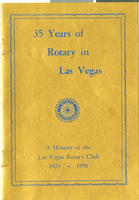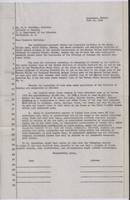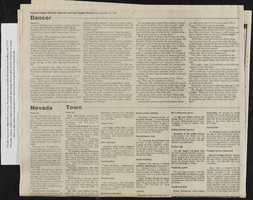Search the Special Collections and Archives Portal
Search Results

35 Years of Rotary in Las Vegas, 1923-1958
Date
Archival Collection
Description
Text

Letter from Las Vegas Chamber of Commerce to R. H. Rutledge (Washington, D.C.), with petition by Moapa Valley residents, June 1939
Date
Archival Collection
Description
Letter dated June 27, 1939, from the Las Vegas Chamber of Commerce supporting a petition date June 21, 1939, by property owners and taxpayers living in the Moapa Valley area of Clark County, Nevada. The petition requested that the area be placed under the control of the Division of Grazing. Such a designation would restrict the removal of timber from watershed areas and help prevent the effects of erosion due to flooding. According to the Bureau of Land Management, Grazing District No. 5 is Las Vegas, established November 3, 1936.
Text

Paul Sogan interview, May 16, 1995: transcript
Date
Archival Collection
Description
Interviewer: Dennis McBride
Text

Theresa Thomas interview, February 29, 1980: transcript
Date
Archival Collection
Description
Thomas discusses her family history and arriving to Boulder City, Nevada in 1930. Thomas describes housing in Boulder City and explains that people needed to build their own homes in the 1930s. She then discusses prostitution becoming illegal in Nevada, the Helldorado Parade, and the construction of Hoover Dam (Boulder Dam). Lastly, Thomas recalls how her musical career began and entertainment in casinos.
Text

Transcript of interview with Byron Underhill by Joyce Moore, March 20, 2002
Date
Archival Collection
Description
Byron Underhill's father owned the first Coca-Cola bottling plant, the first beer distributorship, and the first bowling alley in Las Vegas. Byron moved here from Needles, Calif., with his family in 1927. Byron later took over the bottling plant, served in the Army as an aircraft mechanic and a glider pilot during World War II, was a private pilot who worked with Search and Rescue, played in various bands, and suggested to the Lions club that they found a burn unit at University Medical Center that is still the only one in the state
Text

Transcript of interview with Dorothy Kelsey by James M. Greene, January 20, 1975
Date
Archival Collection
Description
On January 20, 1975, collector James M. Greene interviewed housewife, Dorothy Kelsey (born May 28, 1916 in Kingman, Arizona) in her home in Nelson, Nevada. This interview covers the early days of Nelson, Searchlight, and Las Vegas, as Mrs. Kelsey offers an in-depth personal narrative on the life of a local old-timer. The interview concludes with a discussion on hotels and casinos.
Text

Transcript of interview with Hugh E. Key by Bob Bush, February 21, 1980
Date
Archival Collection
Description
On February 21, 1980, collector Bob Bush interviewed porter and retired military man, Hugh E. Key (born on November 17th, 1919 in Fordyce, Arkansas) in Las Vegas, Nevada. This interview covers the life of a Las Vegas old-timer. Hugh Keys’ wife, Mrs. Key, is also present during the interview and offers a few remarks.
Text

Transcript of interview with Kathleen Bryan Gaston by Niki Rodriguez, March 17, 1981
Date
Archival Collection
Description
On March 17, 1981, Niki Rodriguez interviewed Kathleen Bryan Gaston (born 1949 in Las Vegas, Nevada) about her experience living in Southern Nevada. Gaston first talks about her father who moved to Las Vegas and eventually became a justice of the peace, and she also describes how her parents eventually moved to Las Vegas. Gaston later describes how Las Vegas looked as she was growing up and how it has developed since, specifically mentioning the schools she attended and the growth of the Las Vegas Strip.
Text


